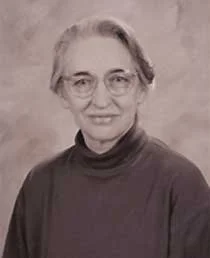There is hope for a tree…
A vision for a Missionary Church
by Fr Eugene Stockton
Rosemary Haughton sees in the new emerging Church of today, as at its beginning, the need for an itinerant teaching ministry modelled on the “travelling companions"”of Jesus, who can supplement and invigorate the pastoral skills of the local church.
Rosemary Haughton is the author of many books on Catholic spirituality. She has a brief page on Wikipedia catholica spiritual marketplace HERE and her books can be viewed on Amazon HERE. Unfortunately the book Eugene is referring to published by the CCJP doesn't appear to be available online.
This view is part of the broader, truly prophetic vision of the world today with its fears and rapid changes, and of the hope engendered by a Church called to conversion. Truly the Church has responded to changes in society with plans to create a better Church, as if fine planning and execution were the key to transformation; but this human creating has been found wanting and is being overtaken by the unpredictable, the work of the Spirit. Rosemary Haughton takes, as a paradigm of what is happening now, the story of the conversion of Cornelius' household, which also meant for the early Church a radical turnabout from being a Jewish to a world-wide phenomenon [Ac.10-11].
In her analysis of Church and of current events, she understands Church, not as a place or society, but as a happening ("Where two or three are gathered together in my name, there am I in the midst of them."). As we come together to make Church, three stages are indicated:
Pre-church: a small number of people gather together for whatever need in prayer, study and action (as the household of Cornelius, Ac. 10:12), waiting and longing for they known not what.
Emerging church: this group becomes aware of itself as church, as centred on and realising (making present) Jesus, knowing itself as his Body, truly risen.
Church in mission: the believers must spread the news that Jesus is risen: they have experienced him and must invite others to do so.
So, as in the experience of believers particularly of Third World countries, church is seen as rising from the ground up (grass-roots communities), not in conflict with the known structural Church, but converting it to a new world.
Missionary activity is not seen as declaring the Word into a spiritual vacuum or planting seed on sterile ground, but as meeting a yearning of the poor already gathered together. Rosemary Haughton sees the catalyst, by which pre-church recognises itself as church, as something coming into its situation "which is able to open up to consciousness what has been present and working unconsciously" [p.8]. This is the messenger, like Peter to the household of Cornelius, or like the companions of Jesus "sent out by the Lord ahead of him...where he himself was about to come [Lk. 10:1]. It is the work of the angel or messenger, not just to bring the individual to awareness of Christ, but rather (as a means to this) to help the community, as a community, to become aware of itself as the place where God's Spirit is at work. Thereafter it belongs to members of the local church to form, support and nourish that church, but an outsider may be able to help to discern, to assist, to correct new growth and sow more seed" [p.21].
The real locus of this encounter is not some huge convention of people. As in the time of Jesus there is an emerging pattern of believing households:
“In some of these Jesus and his friends stayed on their travels, and in their comparative seclusion it was possible for the more intimate and leisurely unfolding of his teaching to take place.” [p.19]
“It was at such households that Paul and others spent their brief rest periods and talked for hours with new converts and with people growing in ministry and later with those engaged in building up existing local churches. And people from those household churches told their friends, drew them in, and sent them out to tell others. The church grew, not as a larger and larger mass but as a multiplication of small 'personal' units of a size capable of effective rapid interaction at every level. This pattern of development is expressed in the theology of the church, which is totally present as the Body of Christ in each gathered community. The ‘great’ Church is not the sum of these but their common incorporation in Christ.” [p.14].
Rosemary Haughton has useful things to say about the quality of these messengers to believing households [p.15-16]. Their commitment, while it lasts (whether temporary or permanent) needs to be absolute, marked by poverty, thoroughly formed in theology. There is demanded:/p>
“a radical dispossession, availability, rootlessness, and finally (if they do this work well) uselessness, since what they are called to is to preach the gospel, see it ‘take root’– and then move on.”
“To sustain the necessary varied and mobile life-style demanded without becoming fragmented, eccentric or son-sided, a basis of taken-for-granted prayerfulness and constant recourse to God is essential.”
“They badly need the affirmation of being recognised as important to the whole church.”
FOOTNOTES:
[1] HAUGHTON, R. 1980 There is Hope for a Tree: A Study Paper on the Emerging Church. CCJP Occasional Paper No. 4, Catholic Commission for Justice and Peace, Sydney.

